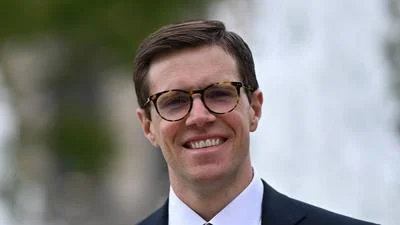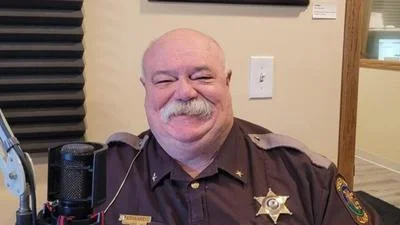During his Wiswell-Robeson Lecture on Monday evening at Monmouth College, veteran agriculture media broadcaster Mike Adams spoke directly to the consumers in the audience – those who consume information and those who consume food.
In other words, Adams had separate messages for everyone in the College’s Dahl Chapel and Auditorium about the state of the media today and about how important agriculture is to our daily lives.
His almost half-century career in ag media linked the two messages, which helped serve the lecture’s purpose of exploring issues, challenges and innovations in agriculture.
“The media has a great opportunity and a great responsibility,” said Adams. “I’m afraid too many in this business today don’t take the ‘responsibility’ part seriously. As information consumers, I ask you to demand that you get accurate information. When you see something, consider the source, consider why it may have been said or put out the way it was, and hold the media accountable.”
Adams was a member of that media for 48 years, including the two decades he hosted the nationally syndicated radio program AgriTalk.
“People in agriculture hold their media more accountable than we do in general in journalism today,” he said. “I pictured somebody sitting by the radio, listening to what I had to say. It was a great honor and a great responsibility that I felt being on the air, because my listeners invited me into their homes, their cars, their trucks and their combines. It’s an on-and-off switch, and I knew that it went off as easily as it went on. If I didn’t do a good job, my listeners would turn it off.”
‘Agriculture is national security’
Adams defined a good job as providing accurate information, and he considered the information important, too, both to farmers and to rural listeners who did not know the intricacies of farm life and food production.
“Folks, agriculture is national security,” he said. “If people in this country never realized it, they’re starting to now. We’ve gone through a pandemic and the supply chain’s been messed up, and things were scarce and harder to get and cost a lot more, and all these consumers were saying, ‘Why? What’s going on?’ We have to educate them on what’s happening.”
“Folks, agriculture is national security. If people in this country never realized it, they’re starting to now.” – Mike Adams
If that makes Adams sound like a “promoter,” he’s comfortable with that descriptor, as long as he’s promoting agriculture in an accurate fashion.
“People criticize those of us in the ag media for being promoters,” he said. “Yes, we’re promoters of agriculture – there’s no doubt about it. But we’re also educators. I had rural listeners who lived in a farm community who had no idea what went on on a farm. I could explain things to them.”
Adams said emails he received over the years proved that even issues related to agriculture could be divisive, especially in terms of protecting our air, water and land.
“People who have never been hungry find it easy to be critical of food production,” he said. “It’s not until something’s been taken away that people realize how important it is and how good it is. That’s why it’s important for us to tell agriculture’s message accurately.”
From uninformed to misinformed
Adams contrasted the norm in ag media to what he said has become the norm in mainstream media.
“Too many people want to be stars,” he said. “I was always told, ‘The story isn’t about you. Don’t try to be the story – tell the story.’”
MIKE ADAMS: “I would tell you today that our media, in general, has failed us."The desire to be known for promoting personal opinions – often at the expense of actual facts – has the country on a dangerous path, warned Adams.
“Clicks and likes have become more important than facts,” he said. “If they’re wrong, move on. People forget about it and don’t hold them accountable. … Personalities have replaced journalists. I’m talking both sides of the political aisle here.”
Opinions are prevalent, said Adams, but accurate information is lagging far behind.
“We have gone in this country from being uninformed to being misinformed,” he said. “If we don’t demand better journalism … we’re going to be vulnerable to very destructive forces in our country.”
“Clicks and likes have become more important than facts. If they’re wrong, move on. People forget about it and don’t hold them accountable. … Personalities have replaced journalists. I’m talking both sides of the political aisle here.” – MIke Adams
A lay minister, Adams said he’s observed an ironic attitude from the general public.
“Hold the media accountable and consider the source – everything on the internet is not accurate,” he said. “It’s kind of scary when people think everything on the internet is true but question what’s in the Bible. That frightens me, OK? We’ve got that backwards.”
The Wiswell-Robeson Lecture was founded in 2016 through a gift from 1960 Monmouth graduate Jeanne Gittings Robeson of Monmouth. Robeson and her late husband, Don Robeson, who was a 1954 Monmouth graduate, operated their farm in Warren County.
Original source can be found here.




 Alerts Sign-up
Alerts Sign-up